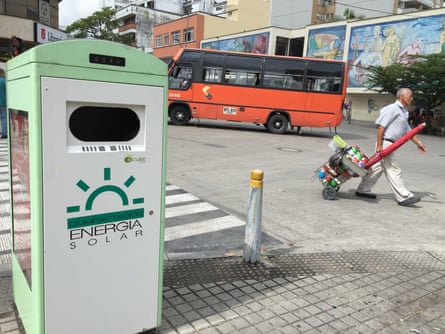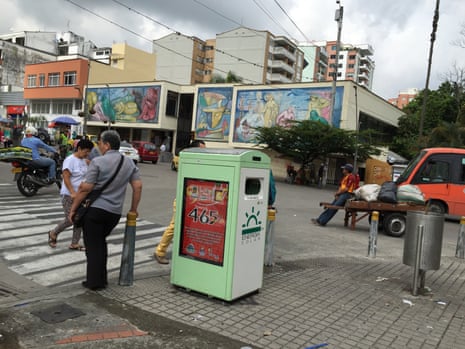Cities have a huge waste problem. Levels are expected to more than double (pdf) over the next 20 years in low and middle income countries as the population increases towards an estimated 8.6 billion by 2030.
Ecube Labs is one of a handful of startups trying to tackle the issue through technology. Based in South Korea, the company produces solar-powered, smart waste bins which allow cities to monitor the levels of rubbish in each bin. The tech also compacts the waste. It has established some 2,500 smart waste networks at cities, campuses, amusement parks and restaurants worldwide, and expects to double the number by the end of the year.
Waste technology is not usually top of the list when it comes to smart city infrastructure; energy, transportation or water tend to get more attention. But the market is growing (pdf), with smart urban waste solutions estimated to help process more than 40% of all urban waste worldwide.
While most of the growing industry’s focus is on Europe and the US, Ecube Labs says it wants to prove that Latin America is full of potential and is piloting schemes in Colombia. “When we talk to investors and even [the] media, they always have this misconception that our solutions are only for rich countries,” says Roger Kim, Ecube Labs’s executive director. “We tried to prove people wrong.”
Several Latin American cities such as Bogota, Buenos Aires, Mexico City and Santiago are already adopting digital tracking of waste collection trucks, says Juan Alfredo Rihm Silva, water and sanitation specialist at the Washington-based Inter-American Development Bank (IADB). “Latin America is becoming more environmentally aware and tech-savvier,” he says.
Colombia’s quasi-governmental organisation Interaseo, in charge of the country’s waste management, wanted to solve the problem of overflowing bins in busy areas where bigger bins couldn’t necessarily fit, Kim says.
In 2015 Ecube Labs equipped two cities, Ibague and Santa Marta, with smart waste networks using 130 of its Clean Cubes – sleekly designed bins fitted with compactors and fill sensors that report when the bin is ready to be picked up – as well as a Wi-Fi hotspot and an LED ad screen, all powered by a solar panel.

However, to scale in emerging markets such as Colombia, Ecube Labs understood it would have to bring the prices down. That meant finding a solution which didn’t involve replacing a city’s entire existing infrastructure with its $2,000-$3,000 (£1,400-£2,000) Clean Cube smart bins.
It adapted its technology to focus on a cheaper way of providing the most important element: the data. That culminated in the Clean Cap, a fist-sized sensor with a 10-year battery life that can be fastened to a city’s existing bins of all sizes. Debuted in late 2014, the Clean Cap has been distributed in Europe, the Middle East, Asia, North America and Mexico, and Ecube Labs aims to use it to give more options to Latin American cities.
Appeal of smart bins
Cities like the smart system because drivers don’t have to waste time checking on empty bins. This reduces the hours they work and can lower waste management operational costs by 80% percent, according to Ecube Labs.
The network can be accessed on an app by drivers or management in an office. On top of sensing how full the bins are, the software predicts when the bins will be full and provides recommendations for driver shift changes, route alterations, optimal bin sizes and other ways to enhance operations.
While rivals like US-based Bigbelly and Finnish startup Enevo also handle smart waste systems, Ecube Labs believes the customisability of both its hardware and software is its edge in a growing market. For example, Kim says, Interaseo chose the Clean Cube because it could fit the city’s existing bins. “If you want to solve the waste issue … you have to accommodate the city, you have to customise the solution,” Kim says.
But there is a limit to how much the smart waste industry can grow, which is the point when technology development outpaces market adoption. Waste management chiefs, Kim says, are typically resistant to investing in new methods.
Top-down decision-making process for financing waste management projects means people at the top must endorse it, says Kim. Meanwhile, the management often faces resistance from the collectors on the ground, who may fear for their jobs or simply refuse to take advice from a faceless app.
During training sessions in Korea, when asked to only collect the bins when they are 90% full or higher, collectors still collected when they were less than 50% filled, Kim said, adding that it took six months on average to convince workers to use the solution effectively.
“The problem with the top-to-bottom type of approach is that even if we prove the effectiveness of the solution ... the cities need [endorsement] from the collectors themselves,” Kim says.
This hasn’t stalled interest in Ecube Labs’s technology. The company has had expressions of interest from cities in Mexico, Chile and Brazil, where it is working on arranging pilot projects with the Clean Cap for mass market deployment.
While acknowledging the potential of smart waste solutions in the region, IADB’s Rihm Silva warns of possible negative social effects. “For example, in some cities in the region, informal recyclers work by extracting valuable recyclables straight from the street’s collection bins – sometimes even forcing themselves into the bins,” he says. “The addition of compaction technology to bins would have a social impact in this case, which would need to be considered and mitigated.”
Eric Woods, research director at Navigant Research, believes there is a strong desire in Latin America to address urban infrastructure and service issues. “There is a good potential [for smart waste systems] as Latin American cities adopt new technologies to address the long-term underinvestment in city infrastructure and services,” he says, adding that Ecube Labs’s easy-deployment, low-maintenance approach works well in Latin America, where there is even more need to be pragmatic and show quick wins.

Comments (…)
Sign in or create your Guardian account to join the discussion